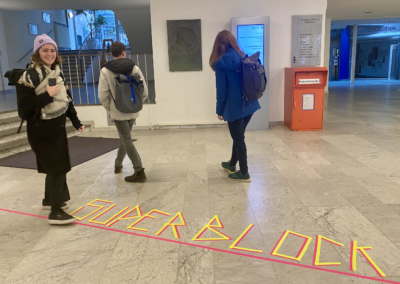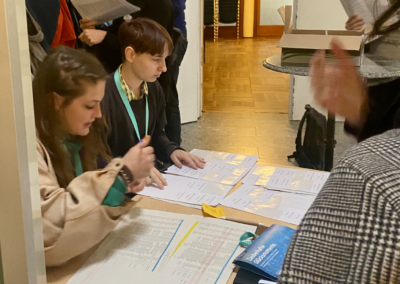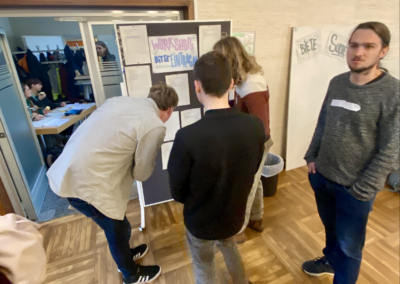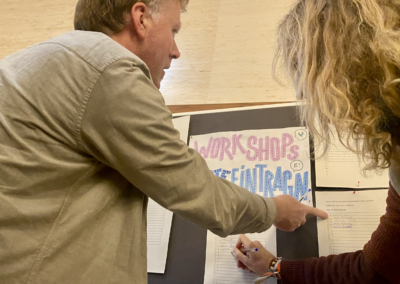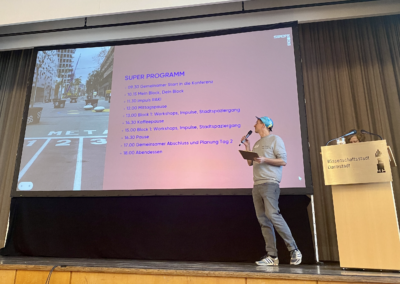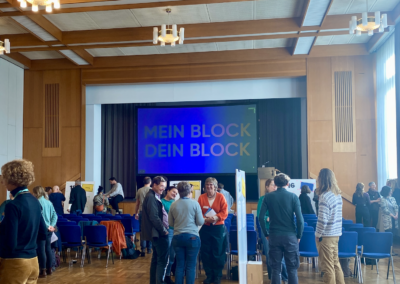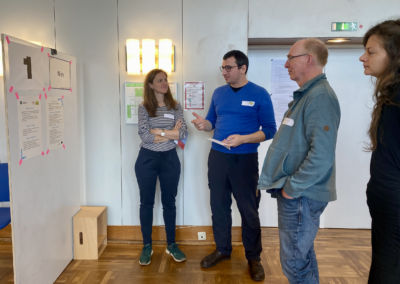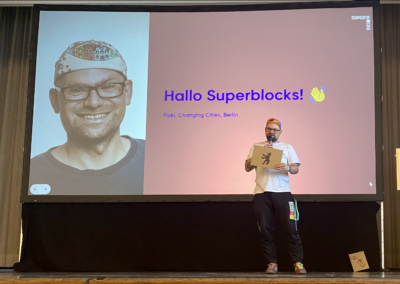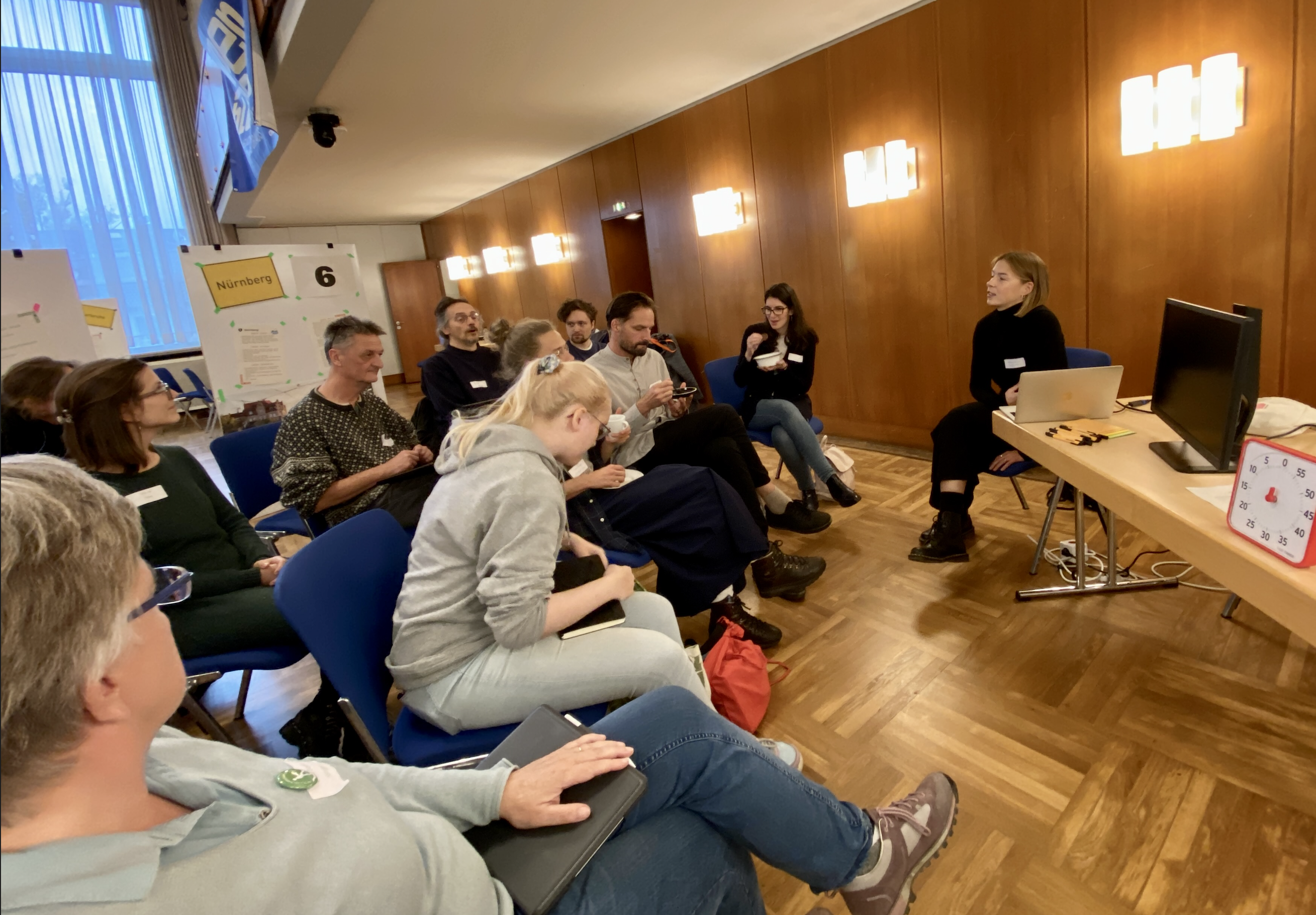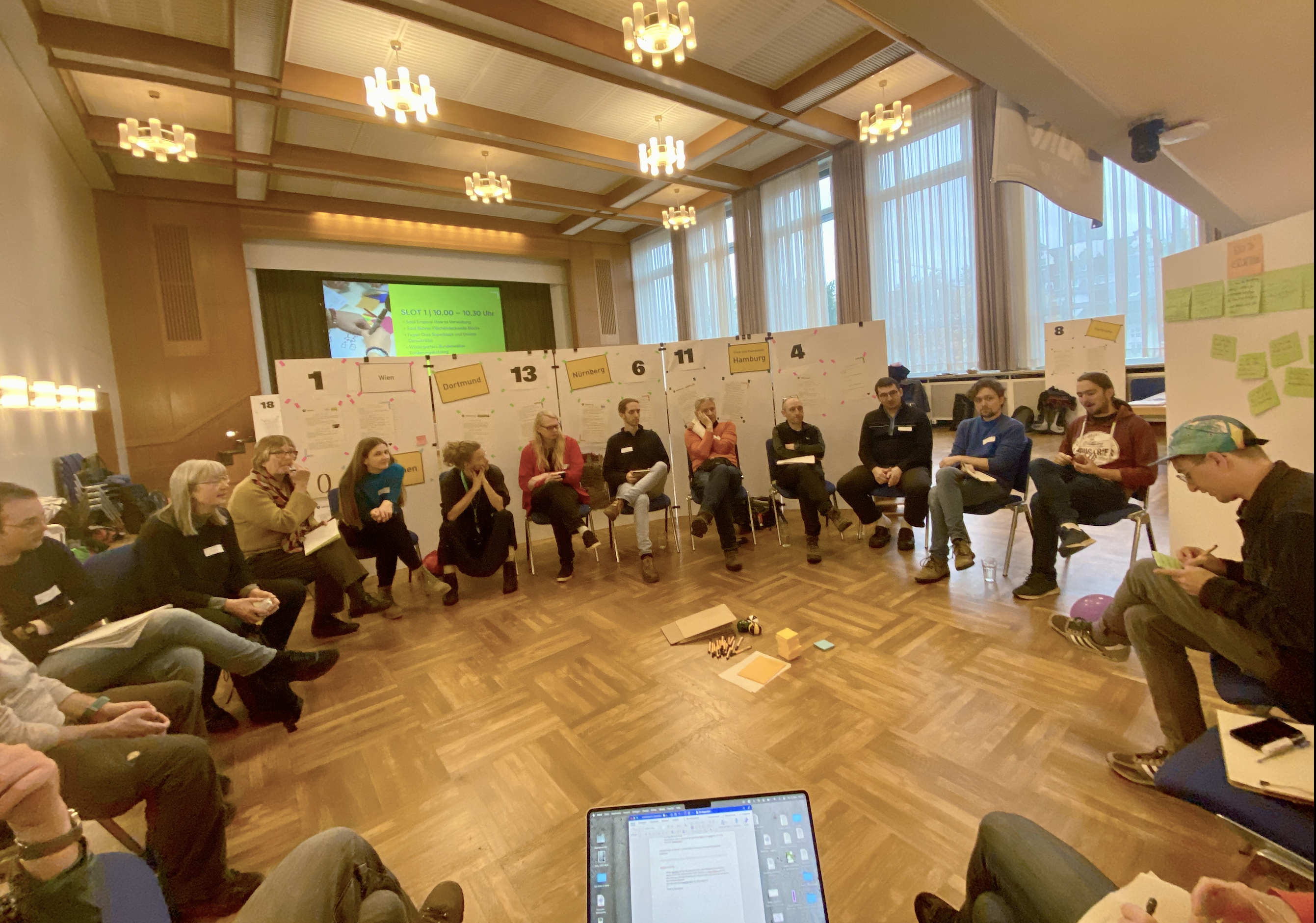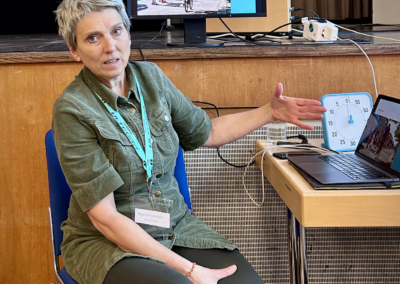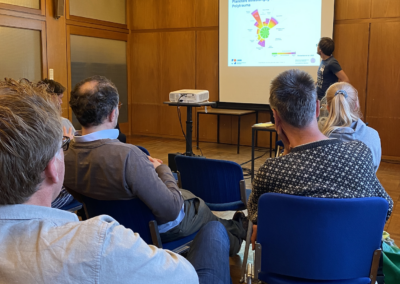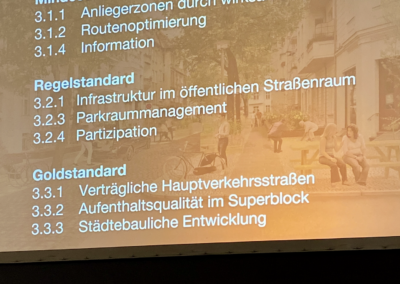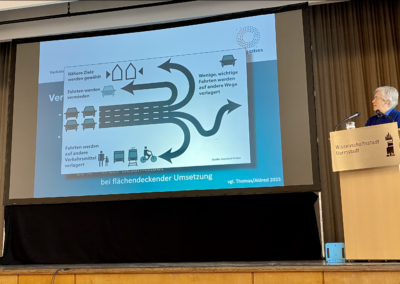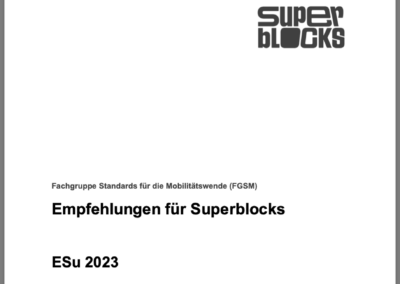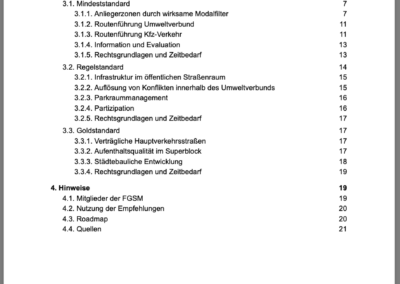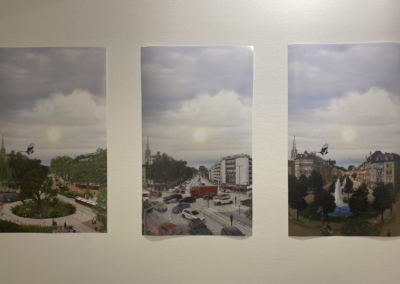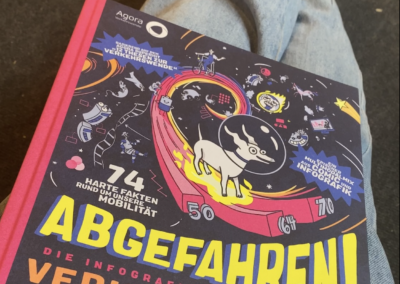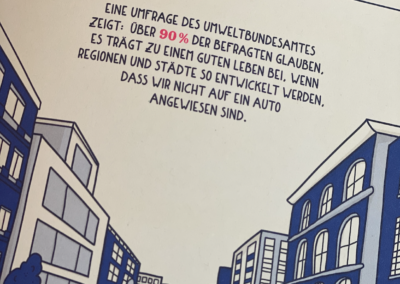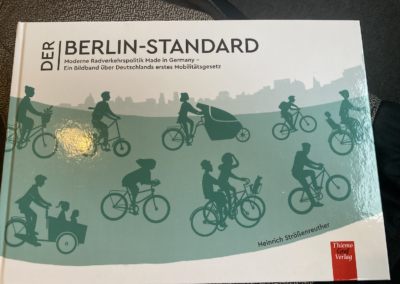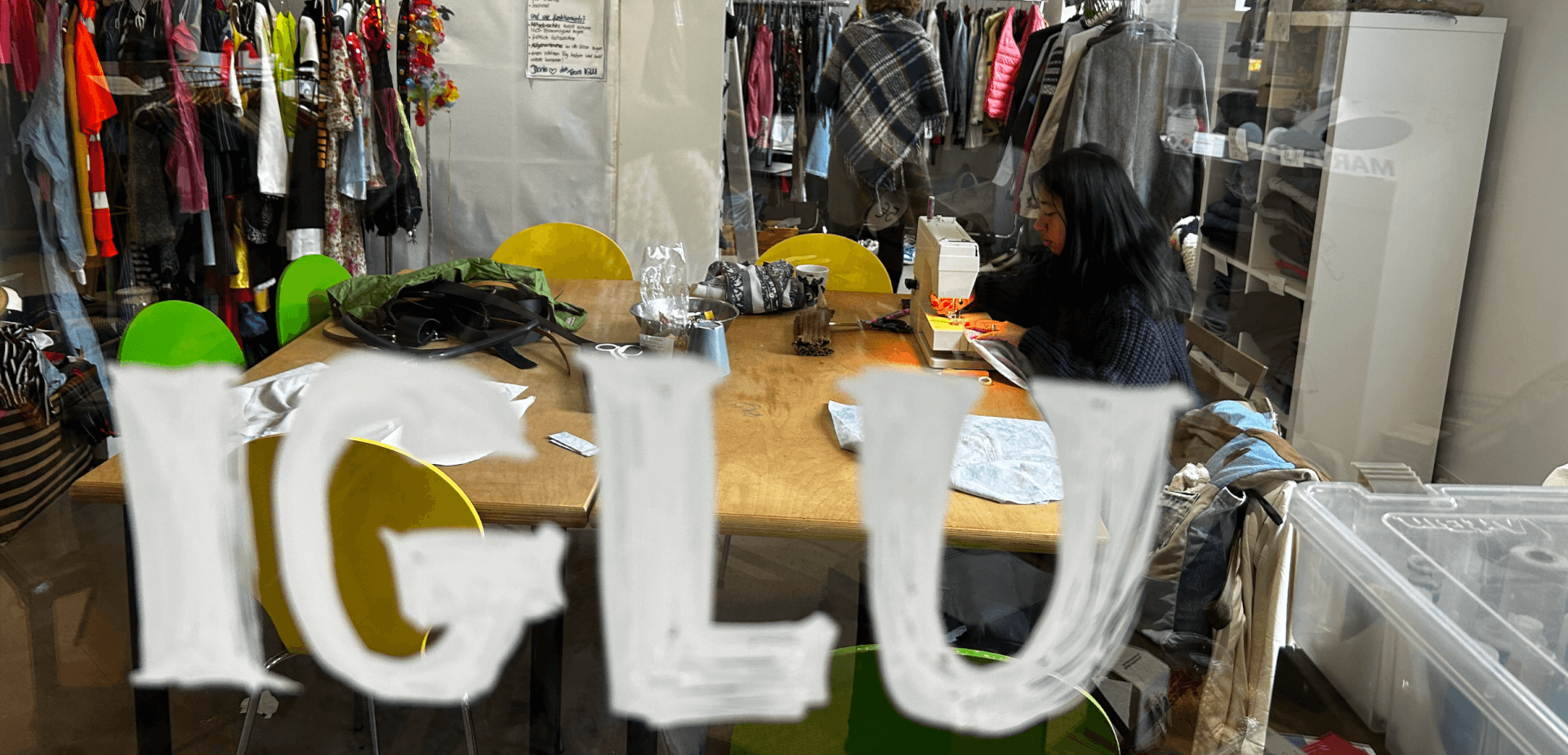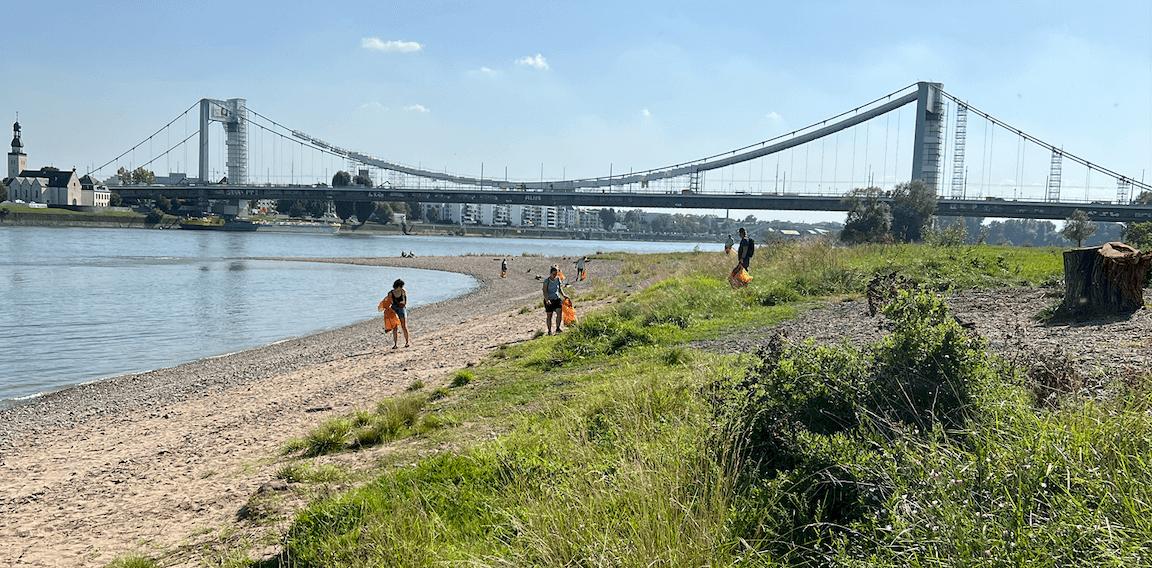Reading time: 16 min.
So I was in Darmstadt for a weekend as part of my citizens' initiative from Cologne, invited by an organization from Berlin. Guests: around 20 other cities, from Munich to Hamburg, from Kempen to Leipzig.
The reason for all this: The German Superblock movement, brought together for the first time in a conference.(For details on Superblocks see below - In brief: We make a neighborhood safer and more livable).
...There was a lot going on, I can tell you! Fantastic people, great projects and a super positive spirit of optimism.
Since I came back to Cologne completely inspired and motivated, the whole thing had to become a topic for Walby too, so I made an appointment with the great Ragnhild, who has been doing PR for the Berlin Kiezblöcke and Changing Cities for five years (and apparently knows all the tricks of the trade).
Our focus topics: The most common prejudices and resentments people have against change (positive ones, mind you!), why it's so hard to achieve, even when everyone wants it, and of course: Superblocks!
In the following, Ragnhild's expertise meets my thoughts and experiences on the subject of sustainable urban design and Superblock - Have fun!
...Julia_TeamWalby...
The term superblock sounds totally appealing to me, but some also say it has a connotation of "against!" for them because of the "blockade" association. Yes, I can understand that too. However, I quite like being against it sometimes, so this aspect of the meaning doesn't bother me, rather the opposite.
However, there is actually a super positive, forward-looking idea behind it: Namely to restore urban spaces, for example a city district or part of it, to a human-centered state to a human-centered state, i.e. to make our immediate surroundings more liveable.
The idea of the superblock is to create more free space and safety for people and sustainable mobility by filtering out unnecessary through traffic and preventing shortcuts. But there can be much more to it than that, as the origins in Barcelona and their current design show very well: The end result is incredibly liveable, healthier, safer and fairer urban spaces for ALL.
But it always starts with a group of motivated people who have a vision and just get on with it.
Ragnhild Sørensen_ChangingCities
We launched the bicycle refer endum in Berlin in 2015/16. We were the first bicycle referendum in Germany to collect over 100,000 signatures within three and a half weeks for a pedestrian and bicycle-friendly Berlin. And in the course of this it was clear: we need donations, we need to have an organization behind us, we can't do this as individuals. As a result, we founded Changing Cities as an association with the aim of not only implementing the cycling decision, but also promoting liveable cities.
We didn't just want to be an association that has a general meeting once a year and then you can submit motions and the board decides what to do. The basic idea is to be fast and agile. This is a completely different way of being active in modern society if we want to achieve something politically.
Above all, we want to be quick and able to react to the world, which is why we said we only need 12 members. But in principle, anyone who comes along and says: "I'm unhappy with the way the public space on my doorstep is, I want to change something!" can join.
The basic idea is to be fast and agile. This is a completely different way of being active in modern society if we want to achieve something politically.
...Julia_TW...
As a bureaucracy-hater and defender of short distances, that sounds great to me, I would like to get back on the road immediately. But - I know! - that's not really how the traffic turnaround will progress. But it won't happen without intervention either. Or in absurdly small, slow steps.
Why is that - after all, sustainable urban developments are officially a done deal...? Why do we still have to try so hard ourselves?
Ragnhild_CC
It's important because otherwise nothing will happen. In the bicycle referendum [editor's note: citizens' survey on local transportation change 2016], we found that There was a huge need for change and transformation among the population in Berlin at the time.
But the politicians and the administration said: Nope, we don't see it at all. And that's why we've always framed it by saying that we have an urban population that wants much, much more, that wants its environment to be very different from what is currently expected by most politicians and administrations and in the whole discourse.
We want to represent these people, but we can only do this if we succeed in politicizing transport policy - which at that time, i.e. 2015/16, was more or less an engineering science - and say: we are "only" citizens, we are "only" civil society, but we live here and we know what is happening on our doorstep and we are also experts to a certain extent who can have a say . We can't just leave these really, really important decisions to a very, very few experts; we have to enter into a dialog.
Of course, we need the experts, but we need to enter into a dialog between civil society and experts, administration and politics in order to drive forward the transport transition. If we just say we'll wait for them to do it, then we won't make any progress.
...Julia_TW...
It always seems completely absurd to me: It feels like the whole world now knows which direction we should, no, must all go in - but somehow the change is not gaining momentum. Yet the status quo is so obviously outdated; most districts are clearly and noticeably not people-friendly, but above all car-friendly.
Incidentally, this has to do with a trend towards urban exodus in the 1980s, which people wanted to stop by, among other things, promoting the convenience of cars in cities - by creating as many roads and parking spaces as possible.
So, this situation has been over for more than three decades, the cities are overflowing with people, but they are still optimized for cars. We have probably endured this legacy long enough now; it is time - not least because of the changes that have become relevant in terms of climate technology - to reclaim the cities and public spaces.
Citizens vs forces of inertia
Ragnhild_CC
There is slowly an awareness that something has to happen, also due to climate change. We have to react somewhere, we have to start reassessing and implementing things. But the persistent tendencies in administration and politics are stuck in a quagmire and it is very difficult for them to get out of it.
Sometimes there are good reasons. They might be older people who are no longer as agile. Sometimes it's simply people who have been doing something for 30-40 years and then you believe that it's right, even if the world has changed in the meantime. And sometimes there are very clear, ideological reasons: You don't want any change at all.
These forces of inertia are everywhere, and if we simply remain silent and don't set a very clear course and articulate what we want politically, then the forces of inertia will win out.
...Julia_TW...
We therefore need to implement the things that we need, that are theoretically desirable, but that are still not really being put into practice in the slow-moving swamp of overtired administrations and oversaturated political authorities. Check.
The Superblock conference in Darmstadt, where the Germany-wide Superblock initiatives met for the first time, was held in precisely this spirit. These are all people who are working on a voluntary basis to make their city more sustainable and fairer. Interest in this topic has obviously increased significantly recently - a few years ago, no one would have crowed about it.
Ragnhild_CC
The background to this is that we started a kind of superblock movement in Berlin in 2020 - in Berlin they are called "Kiezblock" because there are "Kieze" in Berlin.
We started this movement partly out of frustration. We realized that although we had negotiated the mobility law beforehand and it was passed, implementation was progressing incredibly slowly. And then we said that we had to start somewhere else; it's obviously not enough to have a law to implement the transport transition. OK, what else can we do...?
And then we saw the ideas from Barcelona, which were very inspiring at the time. And we said, if they can do it, then we can do it too.
We then tried to start this movement in Berlin and now have 70 Kiezblock initiatives in Berlin alone, of which around 29 are currently being implemented. That happened incredibly quickly, and of course we realized: OK, if it works in Berlin, it will work elsewhere too. In other words, we've gained lots and lots of experience here: How it works, how it works, how you can organize so many people, what they have to do themselves, what they need from us, and so on.
And then we said: now we think we're ready to roll it out nationwide. The idea was to start with a conference for the groups that exist all over Germany; they keep calling us and saying: "...Can't you help, we'd love to!" - and then we said we had to bundle this together and try to give the go-ahead; that we would now go out and scale up superblocks nationwide.
...Julia_TW...
Sounds too good to be true: The idea of more and more people in more and more cities realizing the potential of a more people-friendly environment - and then simply implementing it with the momentum of the collective.
And as it turns out, you don't even need major construction projects or anything like that - au contraire! - a few bollards are enough to get you started! A few simple redesigns to divert through traffic are enough to get the most out of it.
Something else makes sense.
Ragnhild_CC
Why does traffic that I don't want have to drive through my neighborhood? What's it doing here anyway?!
The air gets dirtier, it makes noise, the neighborhood becomes unsafe for children and senior citizens, for everyone - it makes no sense at all!
Of course, traffic could also choose a different route if we wanted it to. But that has to be organized, traffic engineering has to be introduced and various measures have to be taken. But basically, there is absolutely no reason why this non-local traffic should drive through such residential areas.
...Julia_TW...
Less unnecessary traffic sounds totally logical to me, but unfortunately it doesn't make many people shout "Eureka!". And yet everyone in the cities has long been annoyed; my thesis is that there are two clear reasons for this: 1. capitalism, 2. unfriendly urban design.
Let's leave point 1 at this point, otherwise I'll get myself all worked up again to an unhealthy extent. Besides, it doesn't really matter here at the moment. Unless it's about the car lobby... but no - another time.
Point 2. is the more relevant one here: It is too hot in summer (partly because of too much traffic), it is unhealthy because of the bad air (partly because of too much traffic), it is dangerous and noisy (partly because of too much traffic), it is cumbersome because of a lack of mobility options, it is too lonely for many and it is unfair because our urban planning has so far been optimized for adults, men and people without disabilities.
Sounds harsh, but it's true.
Should it be changed? Yes, I think so too.
So why this reticence in the face of urban change when the vision is so positive, I ask myself far too often - and now Ragnhild too.
Armchairs, barbecues & lockers in the parking lot
Ragnhild_CC
It's almost always about the parking spaces. They are the problem. People think I won't be able to park anywhere in the future.
It's this convenience that we've become accustomed to - you just have to say it: it's extremely convenient to sit in the car; it's raining a bit and then I drive five minutes to the bakery; and then I just do it because I can. ...Does that make sense?!
Is it efficient in terms of resource consumption? We [editor's note: the general public ] don't ask ourselves these questions. But these are the questions we [A.d. R.: Changing Cities] would like to ask, because we think we need to talk more about convenience, which is totally understandable.
But we simply have to get away from this car comfort to some extent, because we are gaining so much on other levels: In other words, everything from exercise to much healthier cities with less car traffic [editor's note: this includes more road safety for children and cyclists, noise and heat protection, seating options, especially for older people or breastfeeding mothers, more inclusion for people with limited mobility, free movement and communication spaces for everyone, etc.] - but that's a long way off because people can't even imagine it.
And when people then say "...But my parking space!", it's partly because for 70 years parking spaces have often cost nothing - in other words, people think: I have the right to park my car on the street. I always say: Yes, you might think - but why don't I have the right to put my cupboard in the parking lot?
Only cars are allowed to park there. It's only for vehicle traffic and it doesn't cost anything, even though public space is actually expensive and valuable!
...Julia_TW...
Well, public space is one of those things. Unfortunately, it is often misunderstood. But it could be so beautiful: places to meet, to be idle, to play, to grow food, to work outdoors, to celebrate, to be together, and, and, and. In my street, for example, there is none of this to be seen. Instead, a whopping 88 cars are parked here for around 170 meters. And that's all the space there is. Unfortunately, so is the space on the sidewalk in many places, btw.
A little anecdote: I called and wrote to the city for almost three years to convert a few of the parking spaces into trees, at best including seating and bicycle stands. ...Jeez!!! - What I've had to listen to about this! But I also think that everyone is entitled to this space. In this spirit, ma wonderful neighbor once put a small armchair for waiting customers in front of her salon between the cars parked there instead of a cupboard - but the public order office was quick to shoo her away. ...Get your priorities straight, people!!!
To cut a long story short: even the parking spaces, which many people want more of, should actually be reduced - I just think so. (And that's why my trees are coming in 2024. Please post any excitement and insults in the comments, haha).
My conversation partner Ragnhild at the PR workshop
My conversation partner Ragnhild at the PR workshop
Lecture: Healthy cities from a medical perspective
Lecture: Healthy cities from a medical perspective
Ragnhild_CC
I always like to give the example: Berlin's transportation planning calculates like this: The resident in Berlin should have to walk about 400 meters to the nearest mobility service. So that's what we expect from people who use public transport. That's right - it's not always right, sometimes it's a bit longer and it's not ideal everywhere - but at least that's the target.
You could also say: Okay, we'll take the mobility offer - and not just public transport, not just the bus, but also my car. And that would only be fair: it's not a disadvantage of car traffic, it's just equality if I have to walk 400 meters to my car.
In so many different ways, driving is privileged in relation to other things and we don't even know the other side ; we don't even think about what it's like to drive or walk on unsafe cycle paths or unsafe footpaths. Or when I have bus stops that are incredibly difficult to see for other traffic, and so on.
There is so much underprivileged mobility behavior and this [editor's note: mobility change] is not because we want to get rid of cars, but what would happen if we just created equal rights, then the world would suddenly look completely different." And I think that's a very good way to start a conversation with people, because these are simply things that they don't know.
...Julia_TW...
Most people think equal rights are great in theory, but when it comes to changing things in practice, many people immediately turn on all the warning lights, because for most people it sounds like a restriction (I'm fine, why shake the status quo?!) and then they start looking for counter-arguments: ...Then the small side streets will surely be overrun! Then I won't be able to find a parking space at all! I would change my mind - but there simply aren't enough public transportation options!...
Ragnhild_CC
It's always interdependent: depending on how you make the offer, people will accept it.
What else are we supposed to do? We can't take the bus ourselves, so if there's no one there, then there's no one there and if it's too dangerous to cycle, then you just don't cycle.
And these steering options, which are always sold as bans, people just need to understand that it is quite normal to create a framework for how traffic should function.
This has nothing to do with bans or that we don't want one or the other.
It has something to do with how we think what is good and right.
And with climate change, there are completely different requirements that actually need to be regulated.
The people who then say "...But my parking space!" are then indirectly saying "I don't want pedestrians to have better routes, more cycle paths or better public transport." Because you don't get both.
...Julia_TW...
In my work for a more sustainable urban design, I always encounter the same fears of those potentially affected (apart from the parking and side street issue): 1. that their car will be taken away, 2. that they will no longer be able to "get through" to their house and 3. that urgent road users such as ambulances will no longer be able to "get through" quickly enough to the right place.
It is paradoxical how often I have had to discuss these topics. Especially since the opposite is true for the "emergency thesis" in particular.
"This traffic deflagration is the be-all and end-all"
Ragnhild_CC
The whole concept is designed in such a way that you can still get everywhere with your car, at least at the beginning [A.d.R.: First step on the way to a fully comprehensive "superblock"]: You can get everywhere in the neighborhood, but you may not get there by the most direct route, as you did before, but have to take a small detour. However, we know from scientific research that this is only the case at the beginning.
This means that people will initially take the detour, but at some point they will think, I could walk the five meters or five minutes to the bakery instead of taking the car, because I now have to take what feels like a long detour . And this so-called traffic deflation is the be-all and end-all of how we can ultimately reduce traffic in the residential areas with the neighborhood blocks or superblocks. So it's really about avoiding car traffic and shifting to walking, cycling and public transport.
And we know that if people change and say, I'll leave my car behind and take my bike or walk or whatever instead, then there will be one less car on the roads and maybe other people will do the same.
And ultimately this means that those who are really dependent on their cars will get through more quickly. So, above all, commercial traffic, tradespeople, people with limited mobility, who really can't help themselves for whatever reason, suddenly have much smoother traffic than in the current situation. This is underestimated, partly because people can't imagine that it works like this.
...Julia_TW...
I have often thought about the topic of (lack of) vision. I don't actually believe that people lack creativity, but rather flexibility, courage and hope for actual implementation. Incidentally, Nicole Loeser from the Institute for Art and Innovation's approach to this topic, which I was able to take away from her keynote at the barcamp "Ecological Sustainability in Culture" at the beginning of September ('23), is exciting: "Due to the complex socio-economic, cultural and ecological challenges in the 21st century, value-based visions and a strong imagination are needed in which people can reflect themselves in order to be able to steer towards positive futures". So this is about using creative forces to evoke positive visions in people again. Because without this, we simply lack a goal in sight and therefore also confidence, drive and courage.
In my view, the most important thing about these positive future scenarios is that they need to be clear. They need specifics instead of hollow phrases.
I was therefore completely thrilled by the novelty that made its debut at the Superblock conference: the "Recommendations for Superblocks" were presented to the public. If I understood correctly, this work was created because there was again a certain frustration with the political authorities - in this case the FGSV (Road Traffic Research Association in Germany), which seems to be stoically doing its thing without letting anyone from the grassroots have a say.
One conference, several steps forward
Ragnhild_CC
Within this framework, we then said: Now we are developing standards, but we are not doing it like the FGSV. It's a closed circle, you can't get into it, there's no participation at all and it's completely non-transparent.
That's why we started an open process where we invited people - from the administration, from disability associations, everyone who had something to say - and asked them to evaluate the first draft. And they always gave input and said "...you've really forgotten us here" or "...we still have to take this into account" and then we tried to create an open process and what we presented at the Superblock conference was more or less the result of that. In other words, the attempt to define standards or norms for urban development in a completely open process together with society.
Of course, it's very good for the neighborhoods and superblocks to have something like this and it's also really helpful for the administration. But there is also the desire to integrate all parts of society again when we talk about something communal, such as public space.
...Julia_TW...
A real quantum leap, in my opinion, because we in the Cologne Agnesveedel citizens' initiative have actually already faced precisely this question: What exactly does it take to make a neighborhood more liveable? Obviously we are not alone in this; around 20 initiatives were represented by almost 70 people at the conference - what they all seemed to have in common was the need for just such a guideline.
Ragnhild_CC
I think it's a very big task for the people, the initiatives: "What do we do now, how do we move forward? This and that could be great here for my neighbourhood if it turned out like this, but how do I do it in the end?"
And I hope a little bit that with this conference, with organizing seminars, federal political demands, public relations work and everything else, we managed to give the participants concrete tools so that they can move forward.
I think that was very important. And I also think it was important that there were so many of us.
Because many people are so lone wolves and thought yes, how can I do this, who do I have to talk to and so on, and that is a very clear thing that came out of the conference: you need people. We have to do this together, it's not something that one or two people can do.
We need a wide range of people, we need the retailers in your superblock, you need the church, the school, the senior citizens' association, whatever - you have to persuade them all and get them on board, because only then will there be enough political pressure to really move the local authority. And if you then present them with the standards and say, "This is how it works", then it's difficult to say no.
Exhibition of urban visions
Welcoming you at the entrance: an exhibition of urban visions by Jan Kamensky and others
...Julia_TW...
Getting political authorities to stop saying no. Sounds like a plan.
But is it worth all the personal effort? Is it really worth it? Especially those who are still at the beginning of their commitment often have these doubts in the face of the first stumbling blocks - and there are always stumbling blocks at some point. I feel you - been there, done that.
Ragnhild_CC
That's often what people ask: "What can I do to somehow make things better here, so should I eat less meat or should I cycle or what should I do?"
And our answer is always: becoming politically active is what really makes a difference.
It's great if everyone cycles and eats less meat - but political engagement is what really makes a difference.
...what she said!!! 🙂
If you're still hesitant because it all sounds a bit like work - yes, it really is. But it's worth it and luckily you don't have to go full steam ahead and design an entire superblock.
For beginners, it's really interesting to first look at what projects already exist in your own area that you might be able to support according to your own capacities. Or - that was my introduction - you can initiate small changes, e.g. through individual measures like my trees. (In most cities, this can be done via an application called "Bügereingabe" - in some places under a similar name - and I'll explain exactly what you have to consider in another article).
One thing remains to be said: It's worth it. Actively shaping your own environment is incredibly enjoyable and is also beneficial on various other levels.
Whatever you decide to do: Let us know on Walby how things are going, if you are looking for support or if you are organizing an event!
Your Julia for Team Walby

